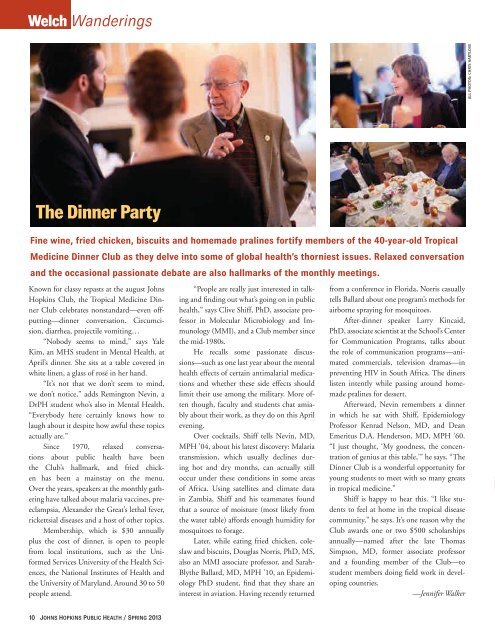this is global health
Download Low Resolution PDF - Johns Hopkins Public Health ...
Download Low Resolution PDF - Johns Hopkins Public Health ...
You also want an ePaper? Increase the reach of your titles
YUMPU automatically turns print PDFs into web optimized ePapers that Google loves.
Welch Wanderings<br />
all photos: chr<strong>is</strong> hartlove<br />
The Dinner Party<br />
Fine wine, fried chicken, b<strong>is</strong>cuits and homemade pralines fortify members of the 40-year-old Tropical<br />
Medicine Dinner Club as they delve into some of <strong>global</strong> <strong>health</strong>’s thorniest <strong>is</strong>sues. Relaxed conversation<br />
and the occasional passionate debate are also hallmarks of the monthly meetings.<br />
Known for classy repasts at the august Johns<br />
Hopkins Club, the Tropical Medicine Dinner<br />
Club celebrates nonstandard—even offputting—dinner<br />
conversation. Circumc<strong>is</strong>ion,<br />
diarrhea, projectile vomiting…<br />
“Nobody seems to mind,” says Yale<br />
Kim, an MHS student in Mental Health, at<br />
April’s dinner. She sits at a table covered in<br />
white linen, a glass of rosé in her hand.<br />
“It’s not that we don’t seem to mind,<br />
we don’t notice,” adds Remington Nevin, a<br />
DrPH student who’s also in Mental Health.<br />
“Everybody here certainly knows how to<br />
laugh about it despite how awful these topics<br />
actually are.”<br />
Since 1970, relaxed conversations<br />
about public <strong>health</strong> have been<br />
the Club’s hallmark, and fried chicken<br />
has been a mainstay on the menu.<br />
Over the years, speakers at the monthly gathering<br />
have talked about malaria vaccines, preeclampsia,<br />
Alexander the Great’s lethal fever,<br />
rickettsial d<strong>is</strong>eases and a host of other topics.<br />
Membership, which <strong>is</strong> $30 annually<br />
plus the cost of dinner, <strong>is</strong> open to people<br />
from local institutions, such as the Uniformed<br />
Services University of the Health Sciences,<br />
the National Institutes of Health and<br />
the University of Maryland. Around 30 to 50<br />
people attend.<br />
“People are really just interested in talking<br />
and finding out what’s going on in public<br />
<strong>health</strong>,” says Clive Shiff, PhD, associate professor<br />
in Molecular Microbiology and Immunology<br />
(MMI), and a Club member since<br />
the mid-1980s.<br />
He recalls some passionate d<strong>is</strong>cussions—such<br />
as one last year about the mental<br />
<strong>health</strong> effects of certain antimalarial medications<br />
and whether these side effects should<br />
limit their use among the military. More often<br />
though, faculty and students chat amiably<br />
about their work, as they do on <strong>th<strong>is</strong></strong> April<br />
evening.<br />
Over cocktails, Shiff tells Nevin, MD,<br />
MPH ’04, about h<strong>is</strong> latest d<strong>is</strong>covery: Malaria<br />
transm<strong>is</strong>sion, which usually declines during<br />
hot and dry months, can actually still<br />
occur under these conditions in some areas<br />
of Africa. Using satellites and climate data<br />
in Zambia, Shiff and h<strong>is</strong> teammates found<br />
that a source of mo<strong>is</strong>ture (most likely from<br />
the water table) affords enough humidity for<br />
mosquitoes to forage.<br />
Later, while eating fried chicken, coleslaw<br />
and b<strong>is</strong>cuits, Douglas Norr<strong>is</strong>, PhD, MS,<br />
also an MMI associate professor, and Sarah-<br />
Blythe Ballard, MD, MPH ’10, an Epidemiology<br />
PhD student, find that they share an<br />
interest in aviation. Having recently returned<br />
from a conference in Florida, Norr<strong>is</strong> casually<br />
tells Ballard about one program’s methods for<br />
airborne spraying for mosquitoes.<br />
After-dinner speaker Larry Kincaid,<br />
PhD, associate scient<strong>is</strong>t at the School’s Center<br />
for Communication Programs, talks about<br />
the role of communication programs—animated<br />
commercials, telev<strong>is</strong>ion dramas—in<br />
preventing HIV in South Africa. The diners<br />
l<strong>is</strong>ten intently while passing around homemade<br />
pralines for dessert.<br />
Afterward, Nevin remembers a dinner<br />
in which he sat with Shiff, Epidemiology<br />
Professor Kenrad Nelson, MD, and Dean<br />
Emeritus D.A. Henderson, MD, MPH ’60.<br />
“I just thought, ‘My goodness, the concentration<br />
of genius at <strong>th<strong>is</strong></strong> table,’” he says. “The<br />
Dinner Club <strong>is</strong> a wonderful opportunity for<br />
young students to meet with so many greats<br />
in tropical medicine.”<br />
Shiff <strong>is</strong> happy to hear <strong>th<strong>is</strong></strong>. “I like students<br />
to feel at home in the tropical d<strong>is</strong>ease<br />
community,” he says. It’s one reason why the<br />
Club awards one or two $500 scholarships<br />
annually—named after the late Thomas<br />
Simpson, MD, former associate professor<br />
and a founding member of the Club—to<br />
student members doing field work in developing<br />
countries.<br />
—Jennifer Walker<br />
10 JOhns hOpkins public healTh / spRing 2013


